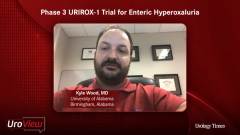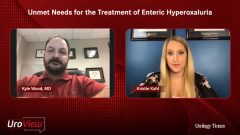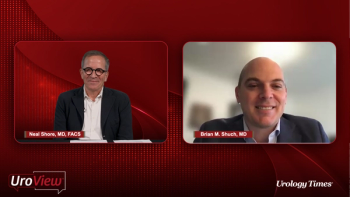
Treatment Options for Enteric Hyperoxaluria
Kyle Wood, MD, reviews current therapies and strategies for the management of enteric hyperoxaluria.
Episodes in this series

Kristie Kahl: Can enteric hyperoxaluria be prevented?
Kyle Wood, MD: It can be. When you look at the big picture, you can say, “Well, the majority of patients with enteric hyperoxaluria have had bariatric surgery.” So if we look at a global prevention strategy, or a national prevention strategy, it would address the obesity epidemic and other factors outside the surgical means. It would be dietary recommendations and weight loss clinics. In addition, if a patient is choosing to have a bariatric surgery, you can try to do another type of surgery, different from the malabsorptive surgeries—although they’ve been shown to be the most beneficial for patients with weight loss. You can consider gastric bands, which is a restrictive procedure. There are obviously treatment options and management strategies that can prevent enteric hyperoxaluria once we identify these patients. With Crohn disease, if you treat the active disease form, you may prevent the patient from having the malabsorptive state. There are various ways to treat the conditions that they have and understanding the population. This avoids malabsorption by gastric bypass if that’s a concern. These patients are often managed with bariatric surgery for obvious reasons—for health benefits—and this is the sequel of those procedures. But there are ways to prevent enteric hyperoxaluria.
Kristie Kahl: You mentioned therapies. What are some treatment options for this disease?
Kyle Wood, MD: I break it down into 4 categories. That’s the way I like to view it. The first 1 is dietary management. Obviously, if you persuade them to take a lower-oxalate diet, which is hard to do, they’ll understand oxalate content in the things they’re eating, which is obviously less oxalate burden to the gut and, therefore, less absorption. The other thing is because of a fat malabsorptive state. If you focus on low-fat foods so that the patient has less fat malabsorption, that can be beneficial. You can talk to them about a high-calcium diet. In the pathophysiological processes, the calcium is being saponified, so if you get them to have a higher-calcium diet—giving them calcium supplements or calcium in their diet—you can bind to more of the oxalate and reduce the oxalate load to the kidneys. As with all kidney stone formers, increased fluids—if you persuade them to drink more fluids—will dilute their urine and make kidney stone formation less likely. That’s the dietary approach that I usually take. The second category is looking at oxalate binders.
I alluded to it, but the use of calcium supplements—giving patients prescription calcium—to increase the amount of calcium that can bind to oxalate will lower oxalate in the urine. Magnesium can be used the same way. The third category we think about is bile acid sequestrants [resins]. This is a malabsorptive process of fat and bile acids. If you use cholestyramine [Questran], or other medications to reduce the bile acids, you may reduce the saponification to calcium, and thus reduce the oxalate load that’s getting absorbed.
The fourth category is for newer ideas that are coming out in clinical trials, which are the oxalate-degrading enzymes or bacteria. We’ve known about Oxalobacter formigenes for quite some time. It’s a normal, gram-negative bacteria that may colonize in the gut and degrade oxalates. The newer novel therapies, currently in phase studies, are looking at degrading oxalate by using enzymes or modifying bacteria. None of those have been approved by the FDA, but those are things we can think about for treating our patients.
Transcript edited for clarity.
Newsletter
Stay current with the latest urology news and practice-changing insights — sign up now for the essential updates every urologist needs.









